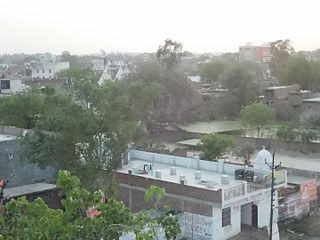
A tariqa is a school or order of Sufism, or specifically a concept for the mystical teaching and spiritual practices of such an order with the aim of seeking haqiqa, which translates as "ultimate truth".

The Chishtī Order is a tariqa, an order or school within the mystic Sufi tradition of Sunni Islam. The Chishti Order is known for its emphasis on love, tolerance, and openness. It began with Abu Ishaq Shami in Chisht, a small town near Herat, Afghanistan, about 930 AD.

Muhammad Nizamuddin Auliya, also known as Hazrat Nizamuddin, and Mahbub-e-Ilahi was an Indian Sunni Muslim scholar, Sufi saint of the Chishti Order, and is one of the most famous Sufis from the Indian Subcontinent. His predecessors were Fariduddin Ganjshakar, Qutbuddin Bakhtiyar Kaki, and Moinuddin Chishti, who were the masters of the Chishti spiritual chain or silsila in the Indian subcontinent.

Naʽat is poetry in praise of the Islamic prophet, Muhammad. The practice is popular in South Asia, commonly in Bengali, Punjabi or Urdu. People who recite Naʽat are known as Naʽat Khawan or sanaʽa-khuaʽan. Exclusive "Praise to Allah" and Allah alone is called Hamd, not to be confused with 'Na'at'.

Ambedkar Nagar is a district in the Indian state of Uttar Pradesh. This district is a part of Faizabad division in the Awadh region of the state. This district was established on 29 September 1995. It was created by the then Chief Minister Mayawati and named in memory of Bhimrao Ambedkar, who worked for the advancement of the deprived classes, women and other weaker sections of society. The total area of Ambedkar Nagar district is 2350 Sq. Km.

Sufi literature consists of works in various languages that express and advocate the ideas of Sufism.
Ashrafpur Kichhauchha is a town and a nagar panchayat in Ambedkar Nagar District in the state of Uttar Pradesh, India. It is well known worldwide as here the shrine of the famous Chisti Sufi saint Sultan Syed Makhdoom Ashraf Jahangir Semnani is located, which attracts millions of devotees irrespective of religion, caste, creed and sex all the year round. The nearest railway station is the Akbarpur station which is about 23 kilometers. Akbarpur station is connected by rail to big cities such as Kolkata, Delhi, Lucknow, Varanasi and Mumbai.

Sultan Makhdoom Ashraf Jahangir Semnani (Urdu: سلطان سید مخدوم اشرف جہانگیر سمنانی; was an Iranian Sufi saint from Semnan, Iran. He was the founder of the Ashrafi Sufi order. He is India's third most influential Sufi Saint after Khwaja Moinuddin Chishti of Ajmer and Nizamuddin Auliya of Delhi.

Akbarpur is a city, municipal corporation, tehsil, and the administrative headquarters of Ambedkar Nagar district in the state of Uttar Pradesh, India. It is a part of Ayodhya division.
Syed Waheed Ashraf is an Indian Sufi scholar and poet in Persian and Urdu. Ashraf received his B.A., M.A. and PhD (1965) degrees from Aligarh Muslim University. The title of his doctoral dissertation was A Critical Edition of Lataife Ashrafi. After serving at a number of Indian universities, Ashraf retired as head of the department of Arabic, Persian and Urdu at the University of Madras in 1993. Fluent in seven languages, he writes in Urdu, Persian and English, has written, edited or compiled over 35 books. Ashraf has focused on upholding and propagating the principles and practices of Sufism.
Syed Amin Ashraf was an Urdu Ghazal poet and critic. He earned his PhD in English Literature from Aligarh Muslim University on the topic Major Themes and Imagery in Sarogini Naidu's Poetry, and later served the same department. He produced three poetic collections and a critical compendium of essays in the form of a book. Several academic awards were conferred on his poetic anthologies, and numerous critical articles and books praised his poetic artistry.

ʿAlā ul-Ḥaq, born as ʿUmar ibn As`ad Khālidī and also known by his sobriquet Ganj-e-Nābāt, was a 14th-century Islamic scholar of Bengal. Posted in Hazrat Pandua, he was the senior disciple and successor of Akhi Siraj, and a Bengal Sultanate government official.

Usman Serajuddin, known affectionately by followers as Akhi Siraj, was a 14th-century Bengali Muslim scholar. He was a Sufi belonging to the Chishti Order and was a disciple of Nizamuddin Auliya of Delhi. As one of the senior disciples of Nizāmuddīn Auliyā, he spent long years with him in Delhi and earned the sobriquet of Āinā-e-Hind. His shrine, the Pirana Pir Dargah in Gaur, West Bengal, attracts hundreds of thousands of devotees every year. Siraj and his successor, Alaul Haq, are credited with the rise to prominence of the Chishti order in Bengal.
Syed Abdur-Razzaq Nurul-Ain was a Sufi saint.
Dr. Syed Abdul Wahab Ashrafi (2 June 1936 – 15 July 2012) was an Indian literary critic and an eminent personality in the world of Urdu literature. He belonged to the family of the Sufi saint Sultan Syed Makhdoom Ashraf Jahangir Semnani

Husām ad-Dīn Mānikpūrī was a 15th-century Islamic scholar of North India. He belonged to the Chishti order, following his teacher Nur Qutb Alam of Bengal.
Syed Mohammed Izhar Ashraf was a Sunni Alim from India. He was the relative of Sajjada Nashin of Syed Ashraf Jahangir Semnani. He was Chief Patron of All India Ulema and Mashaikh Board. He died on 22 February 2012 at age 78 while receiving treatment at the Ismailia Hospital. The Ashraf's are the spritiual descendants of the Sufi saint, Syed Ashraf Jahangir Semnani (d.1386), who had settled in Kichhauchha, U.P., India, after relinquishing his throne in Semnan (Iran), the Ashrafi Family is one of the most revered and authentic families of Hashemite Sayyids residing in India, they trace their lineage to Shaykh 'Abd al-Qadir al-Jilani, the founder of the Qadri tariqa.

Makhdoom Sharfuddin Ahmed bin Yahya Maneri, popularly known as Makhdoom-ul-Mulk Bihari and Makhdoom-e-Jahan (1263–1381), was a 13th-century Sufi mystic.

Syed Mohammed Mukhtar Ashraf (Urdu: سید محمد مختاراشرف, Hindi: सैयद मोहम्मद मुख्तार अशरफ़) well known as Sarkar E Kalan or Shaikh ul Mashaikh was an Indian Sufi saint, spiritual leader, Islamic Scholar of Ahle Sunnah of the Ashrafi sufi order from Ashrafpur Kichhauchha, Uttar Pradesh, India. He was a relative of Sajjada nashin of Dargah Ashraf Jahangir Semnani, founder of the Ashrafi Sufi Order. Syed died on 21 November 1996 in Ashrafpur Kichhauchha and was buried near dargah of Ashraf Jahangir Semnani.

Abdul Lateef Azmi was an Urdu litterateur and among the close associates of the founders of Jamia Millia Islamia. He joined Jamia Millia as a student of B.A. in 1936 and served the university over 50 years in various capacities. He was one of the longest serving editors of Jamia Millia's official magazine, Jamia. He died in Delhi on May 11, 2002. In 1985, Maktaba Jamia, New Delhi, published a book Abdul Lateef Azmi Hayat-o-Khidmat. Several scholars contributed chapters in the book on various facets of Abdul Lateef Azmi and his life.












